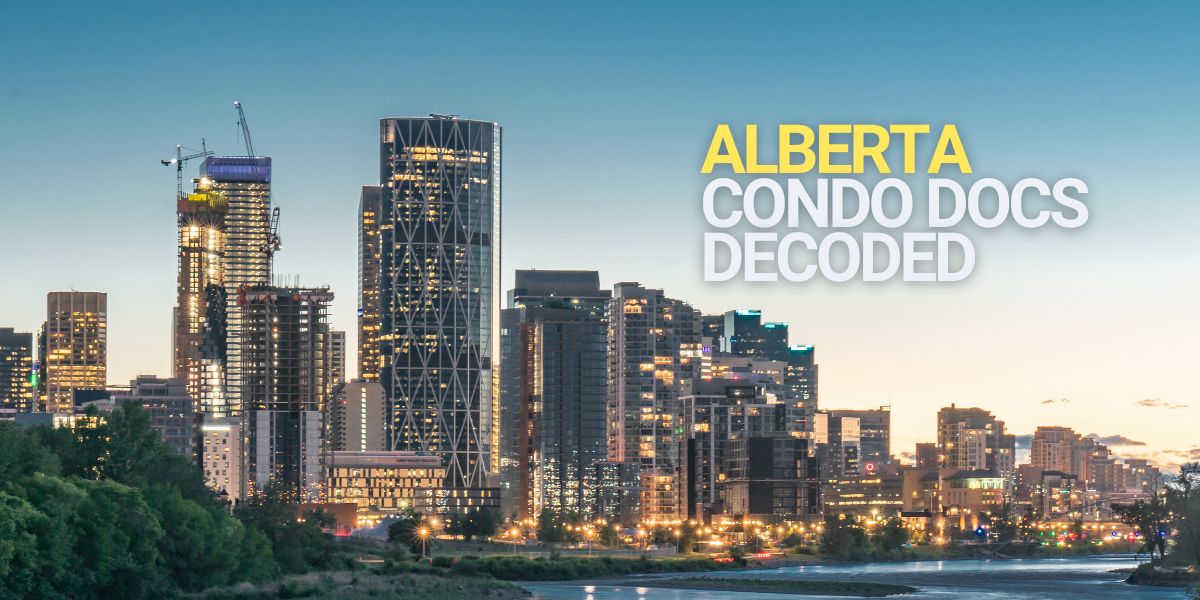
Condo Docs Decoded: What Buyers in Alberta Need to Review (and Why)
Buying a condo isn’t just about location and price—it’s about buying into an entire building. And the truth is: condo documents tell the real story.
If you’re purchasing in Alberta, reviewing condo docs isn’t just a suggestion—it’s essential. These documents contain the warning signs (or positive indicators) that influence your investment, lifestyle, and long-term peace of mind.
6 Must-Check Documents in Every Condo Purchase
Here are the six key condo documents every Alberta buyer should review before they waive conditions or close:
1. Bylaws
The legal DNA of the building.
Tells you what’s allowed (pets, rentals, smoking), how the board operates, and what your rights and responsibilities are.
2. Reserve Fund Study & Plan
The building’s savings account.
This shows whether the corporation is financially prepared for major repairs like roofing, elevators, or parkade work.
3. Operating Budget
Reveals how well the building is managed.
Provides insight into maintenance, utilities, and potential fee increases.
4. Insurance Certificate
Confirms what the condo corporation covers—and what you need to insure yourself.
Key for liability and mortgage approvals.
5. Board Meeting Minutes & AGM Minutes
The voice of the community.
You’ll see complaints, project timelines, and possible future assessments.
6. Estoppel Certificate / Disclosure Statement
This is the legal “status check” on your unit.
Shows unpaid fees, pending lawsuits, and your unit’s financial standing with the condo.
What Each Document Tells You About Risk
Each condo document offers a unique lens into the health of the building—and potential red flags:
Document | Key Risk Indicator |
|---|---|
Bylaws | Restrictive use, outdated governance |
Reserve Fund Study | Underfunded repairs, no plan for aging infrastructure |
Budget | Rising condo fees, mismanagement |
Insurance | Inadequate coverage, special levy risks |
Minutes | Conflict among owners, delayed maintenance |
Estoppel/Disclosure | Unpaid dues, lawsuits, liens |
Buyers frequently ignore nuances such as the absence of quorums, disagreements among owners, or postponed votes on significant repairs.. These aren’t “what-ifs”—they’re risks that become real fast.
How We Turn 100+ Pages Into One Clean Summary
We understand most buyers don’t have time—or the legal background—to analyze technical documents.
That’s why our reviews:
✔️ Flag legal, financial, and operational issues in plain language
✔️ Include a personalized Red | Yellow | Green risk dashboard
✔️ Provide context (e.g., how Alberta legislation applies)
✔️ Offer buyer-specific recommendations (first-time vs investor)
✔️ Are completed in 1–3 business days
🧾 We review over 100 pages of documents, but you walk away with a 3-page actionable summary. Clear, confident, and built to support your decision.
Why This Matters More in Alberta
Alberta’s Condominium Property Act places many obligations on the condo corporation—but enforcement, transparency, and budgeting vary widely.
Without a review:
You could unknowingly waive conditions on an underfunded building
You could buy into a building with illegal short-term rentals or unapproved pet rules
You could walk into a $15,000 special assessment just months after moving in
Buying a condo in Alberta? Don’t guess—verify.
At HomeHealth Solutions, our professional document reviews offer fast, flat-rate insights that protect your future.
✅ Buyers | ✅ Investors | ✅ Real Estate Agent
Frequently Asked Questions
Are all 6 documents legally required in Alberta?
Most reputable sellers and realtors provide these by default, but requirements vary by board and agreement. We can help you check what’s missing.
Do first-time buyers need a review?
Absolutely. This is often the biggest investment of your life. A small upfront cost could save thousands later.
Can I use the review to negotiate with the seller?
Yes. Many buyers use findings (e.g., deferred repairs or governance gaps) to negotiate price or request repairs before closing.